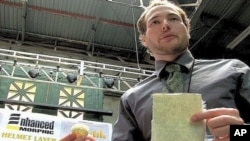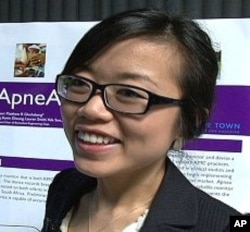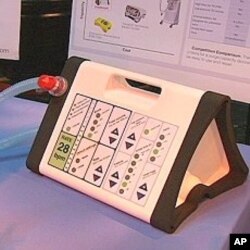It is called March Madness for the Mind, a variation of March Madness, the term for the college competition held each year in March to crown an American champion basketball team.
But this event, held this year at the San Francisco science museum called the Exploratorium, celebrates mental agility. Teams from American universities displayed devices that they have invented and plan to market through companies they have created.
A team from Rensselaer Polytechnic Institute in New York State has developed a portable water purification device, which it hopes to sell around the world for one dollar a unit.
Team member Dave Perry says the filter known as OsmoPure could help one billion people who lack clean drinking water.
"They take a soda bottle and they just fill it up with dirty, nasty water with all sorts of microorganisms crawling around in it that will give you dysentery," he said. "What they do is, they just fill it up with the dirty water and they screw on the bottle-top water purification device and they squeeze the bottle, and clean water just comes out of the top of it that they can then drink."
A team from Colorado State University is creating products aimed at rural women, including a water purification system and birth supplies for mid-wives and hospitals in the developing world.
A Ph.D. graduate from Brown University developed a disposal system for compact fluorescent lamps, which contain dangerous mercury.
Engineering students from Northwestern University have developed a product called ApneAlert. The device is intended for prematurely born infants who are kept close to their mothers in what is known as "kangaroo mother care." The method is a popular alternative to using incubators in the developing world, but it poses a risk of apnea or breathing stoppages. The device that the students developed monitors the child's breathing and sounds an alarm if there is a problem.
Northwestern University student Yale Sun helps to market the product and has been involved with clinical trials in South Africa.
"It's really, really, really exciting," Sun said. "I'm sure for the engineers, it's a daunting task, but for me, it's challenging, it's exciting, you get to talk to all these mothers in clinical trials and talk to them, get their feedback and get to know them personally, and I love it."
Other medical devices include a portable ventilator that could be used in a pandemic, and can also fill a shortage in the developing world, says physician Matt Callaghan, a bio-design fellow at Stanford University.
"When you go overseas and you look at countries like India or China or [in] Africa, the need is not a 'what-if' [a mere possibility], it's a daily routine problem where's you've got thousands of people dying every week because in surgery, you don't have ventilators, in trauma, you don't have ventilators, because of the cost," he said.
The Stanford team hopes to sell a model for $300, a fraction of the cost of larger hospital ventilators.
A Brown University team has created a cart to carry water for the African market. The student-led company is called Anza, which means "start" in Swahili. Steve Cellucci, who chairs the board of directors, says the company already sells solar cookers made from recycled plastic bags in East Africa, and plans to start selling the carts for less than $10 a piece.
"The push-cart is very cheap to make because the wheels are trash, essentially are recycled tires that we have an innovative process of cutting circles out of tire treads and bolting them together to form a very strong wheel," he said.
He says the cart will let small-scale farmers bring water to their plots and extend their growing season, bringing the family supplementary income.
Students from Michigan Technological University are developing better helmets for those who play American football or lacrosse, and those who ride motorcycles. Engineering student Wayne Bell says his family runs a motorcycle shop and he got the idea from friends who had suffered head injuries while riding their motorcycles.
The National Collegiate Inventors and Innovators Alliance has given each of these teams a small amount of funding. Executive Director Phil Weilerstein says it helps them start to make the transition from idea to finished product.
"That involves going well beyond the technological innovation to explore the marketplace and the kinds of things that any business is going to need to be able to explain to investors to get off the ground," he said.
Advisor Humera Fasihuddin tells students how to find investors, get government approvals, and market the products where they can fill a need.
"These students have figured out that they can solve social problems and make money at the same time," Fasihuddin said. "And in making money, they can create self-sustaining and lasting enterprises that reinvest proceeds to do more good."
She says these students bring together technological innovation and business skills with social concerns.







